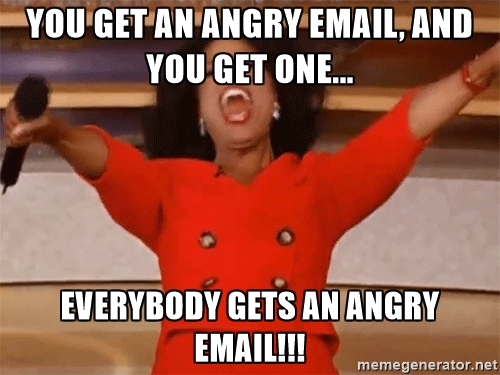Don't Read Too Much Into Emails

This is a public service announcement to help everyone here understand “email tone”. I can almost guarantee you will be happier for having read this today, and every other day going forward.
I believe strongly in not reading things like tone & emotion into email, and I also believe that if you avoid reading too much “between the lines” in emails you will be significantly more effective in life in general (because, hint hint, this applies to more than email).
Recent Motivation for Writing This: You May Know This Feeling
I’ve been all over the place the last few months as we’ve been rapidly scaling up Salsify, and a number of times I’ve heard through backchannels comments to the effect of, “so-and-so is wondering if Rob is mad at him/her?” or “did I do something wrong?”
The cause: a short, one-line, no caps, no greetings, no punctuation, quick answer email from me.
I’ve personally had that reaction to emails in the past, so I get it. A senior exec at a past company I worked for wrote (what I thought at the time) were the most passive-aggressive emails written by any human in history. I would get punch-walls angry after reading them. I had to institute a rule for myself that I wouldn’t read or even open any email from this person over a weekend for my own sanity.
Then, one day, a good friend said to me, “dude, you’re thinking way too much about this; he just can’t write email”. And my friend was right. Every time I spoke to this exec in person, the exchange was friendly and productive.
The emails were terrible, but the man was not. And all of a sudden the terrible emails were suddenly not about me (even though they were still terrible).
Key Lesson
“It’s not about me”. Repeat that, over and over. The tone, the length, the lack of response, almost always has little or nothing to do with me.
As human beings we try to personalize everything that’s happening to us. We make up stories so that every action becomes me-centered. That’s just how it works. It’s your ego trying to make sense of the world, and, simply put, it’s lying to you.
Seth Godin captures this perfectly in Linchpin:
We assign motivations and plots and vendettas where there are none. Those angry customers didn’t wake up this morning deciding to ruin your day, not at all. They’re just angry. It’s not personal and it’s not rational and it certainly isn’t about whether or not you deserve it. It just is. So now what are you going to do about it?
We’re all moving fast in the startup world. When I send a 4-word email without punctuation, it’s because I’m doing it on one hand in the bathroom while taking a 2-minute break from a meeting. The brevity or tone has nothing to do with you. There is no “tone”, there is usually just “how do I answer this as quickly to remove myself as the bottleneck”.
Execs understand this generally, even/especially outside the startup world (imagine being a VP in charge of a 10,000 person multi-$B business unit…). I am significantly more likely to get a one-line email from an exec at a prospect or partner than from an employee. Many execs talk to each other the same way, which is the no-bullshit “I know you’re not going to read into this short sharp email” way. I’ve closed large deals over this type of communication (because truly substantive communication happens over the phone in sales, not email).
Note: execs tend not to use smiley faces to indicate “don’t take this as seriously as you might”. I try to sometimes over e.g. Slack just in case.
Key Lesson (Applied to Email)
(Note the “Applied to Email” in that sub-title. Try to apply the key lesson to, for example, “the last conversation I had” or “why that person was so rude to me”…)
Oversensitivity to perceived email tone or emotional content is not useful to anyone. You cannot read tone into email at all. It’s impossible. Stop it.
Even trying* to *write tone intentionally is hard. Real, full-time writers struggle with writing tone effectively. People more generally who write email are completely incapable of getting tone right. The tone you’re reading into the email you just read? Wrong, and your mistake for thinking you got it right.
Real feedback must be given in a face-to-face meeting with clear communication. Old school.
Though even trying to read tone or emotion during in-person interactions can be deceiving. For example, when I’m concentrating hard on something I look upset (or so my wife tells me). I’m not aware of my face because, you know, I’m concentrating on something other than my facial expression!
The Solution
So what’s the solution? Clear language. If I’m angry/frustrated, I say, for example, “I’m frustrated because…”. No mystery there.
To get back to the “is Rob mad at me?” example we started with: feedback from me that I intend a person to receive will be direct, in-person, and unambiguous. Or it may be delivered in a direct, in-person, and unambiguous way by a direct manager that I’ve spoken with in a direct, in-person, and unambiguous way.
It won’t be delivered as subtext in a terse email written while I’m at the urinal. There is no subtext.
If you wonder what I or anyone else thinks about your performance, ask. If you try to assume you know what I think about your performance, you’re probably wrong (see “upset concentrating face” above).
Or, as I learned in middle school, to ASSUME makes an ASS out of U and ME.
Onward
“It’s not about me”. Say it. Over and over.
Focus on moving forward and what’s next. Focus on being awesome. Focus on things you can control.
Focus not on shit your stupid ego is making up to shake your confidence.
And if you’re reading this, yes, you’re the reason I finally got fed up enough to write this down ;-) (see what I did there with the winky face to indicate that nothing bad was meant by that? I don’t use that in email)
 gonzofy
gonzofy